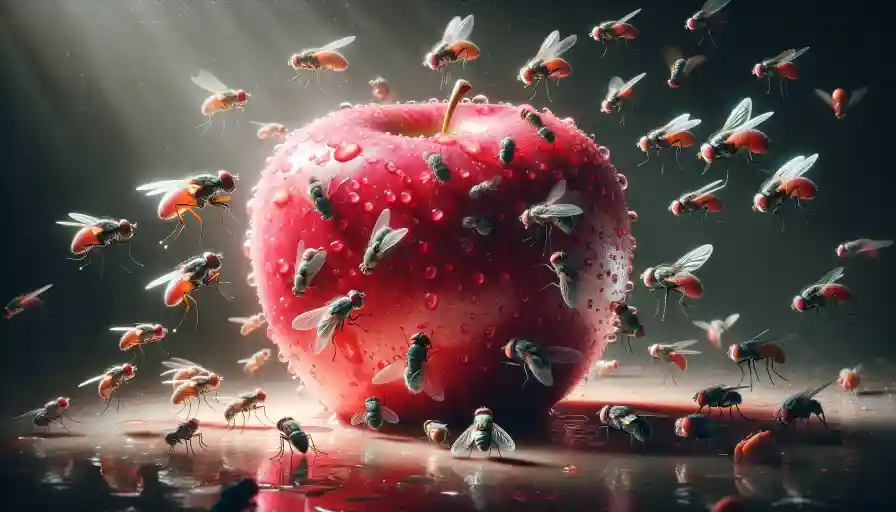Does bleach kill fruit flies? Not really. It is only a misconception that bleach can get rid of fruit flies. It is not close to effective if you plan to permanently get rid of fruit flies on your property.
Fruit flies, also known as sewer gnats, filter flies, or sink flies, are really annoying pests found in homes. Their scientific name is Psychodidae, and they can drive you crazy when they infest your kitchen or bathroom fruit. These tiny insects can be tough, especially if you have rotten fruits nearby. They breed quickly, making the problem worse.
In this post, we’d be getting to understand what fruit flies are, why they are attracted to sink fruit, and whether bleach is worth it or not against fruit flies.
What Are Fruit Flies?

Fruit flies are tiny insects, known scientifically as Drosophila melanogaster. They’re often found buzzing around overripe or fermenting fruits and vegetables. These little flies are famous in scientific research, especially in genetics and developmental biology, because of their simple genetic makeup and rapid reproduction cycle. They have a short lifespan, which allows scientists to study multiple generations in a relatively short period.
Fruit flies are attracted to sugary substances and are common in places where fruits and vegetables are stored.
Fruit flies are different from drain flies; they prefer fruit, septic tanks, and sewers, and feed on decaying matter. While harmless to humans, they can be a nuisance. “Female fruit flies lay their eggs on the surface of rotting fruits and vegetables. Each female may lay as many as 500 eggs”—according to Oklahoma State University.
Does Bleach Kill Fruit Flies?
While bleach can kill fruit flies, it’s not the safest option. Here’s why using bleach against fruit flies isn’t ideal:
- Mixing bleach with substances like ammonia, vinegar, or rubbing alcohol produces toxic fumes. These fumes can cause serious health issues, including respiratory damage and potentially fatal outcomes.
- Bleach can permanently damage septic systems if exposed.
- Bleach can damage plumbing, especially if it reacts with materials inside the pipes or corrodes older or plastic pipes.
- Due to its quick flow, bleach often fails to penetrate the thick layers of fruit fly eggs and larvae in your pipes.
So, for a permanent solution, bleach is not the go-to measure to get rid of fruit flies. Again, bleach is corrosive at full strength and will easily damage old pipes.
How to Keep Fruit Flies at Bay
- Ensure your kitchen and dining areas are clean. Wipe down surfaces and mop floors to remove spills and crumbs.
- Fruit flies are attracted to overripe and fermenting fruits, so regularly check and dispose of any overripe fruits.
- Fill a bowl with apple cider vinegar, cover it with plastic wrap, and poke small holes in the top. Fruit flies are attracted to the vinegar and will get trapped.
- Store ripe fruits in the refrigerator instead of leaving them out in the open.
- Check for and seal any gaps in windows or doors to prevent fruit flies from entering.
- Keep your garbage bins clean and empty them often, especially if they contain food scraps.
- Fruit flies breed in moist environments. Make sure to dry out your sink and any buckets after use.
- Regularly clean drains in your kitchen and bathroom as fruit flies can breed in the residue that builds up.
- Most importantly, store food in airtight containers to prevent fruit flies from accessing and laying eggs on your food.
Don’t hesitate to get expert assistance for the cleaning job.
Conclusion—Does Bleach Kill Fruit Flies?
So, while bleach can kill fruit flies, it is not the go-to solution. It can only kill a few of them, which translates to a temporary solution. You need to permanently get rid of fruit flies while at the same time keeping your home habitable and protecting your plumbing. This means inviting your local pest control to deal with the fruit fly problem.
Read also: Homemade Rat Poison Bleach [How it Works]




